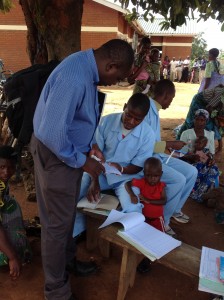Community Health Workers: On the frontlines in the fight against HIV/AIDS

This week in Melbourne, Australia, health and development experts from around the world are coming together at the 20th annual International AIDS Conference. The theme of this year’s conference is “Stepping up the Pace,” which focuses on the critical nature of the current global agenda and the importance of targeting HIV/AIDS in areas where “Key Affected Populations” are being left behind. According to UNAIDS, almost 70% of people living with HIV are in sub-Saharan Africa; recognizing this, the One Million Community Health Worker (1mCHW) Campaign actively advocates for the inclusion of CHWs in policy planning for the eradication of HIV/AIDS in Africa.
CHWs address everything from nutrition and maternal health to tuberculosis and malaria, and HIV/AIDS is no exception to the regular workload of CHWs across sub-Saharan Africa. The communities where CHWs work are often afflicted with extremely high HIV prevalence rates, and CHWs can be crucial in providing medical and emotional support to infected individuals, their families, and the communities in which they live. One of the primary ways that CHWs help HIV-positive populations in rural sub-Saharan Africa is by assisting with the delivery of medical interventions. CHWs have been effectively deployed in Anti-Retroviral Therapy (ART) schemes to treat HIV/AIDS, mainly by supervising pill ingestion. Directly Observed Therapy (DOT) for ART increases medication adherence, ultimately leading to more successful outcomes.
Additionally, CHWs help connect individuals and communities to primary care facilities when available, which can help promote coordination of care for HIV/AIDS patients who live in remote areas. CHWs can screen for symptoms, both of the infection as well as side effects from treatment, and may refer patients to primary health facilities. One program in South Africa, for instance, has CHWs using mobile technology to screen AIDS patients to determine whether they can safely continue their ART regimen or if they require a physician consultation at a clinic. By referring patients in need to primary health care facilities CHWs positively impact disease-related mortality.
Beyond medical services, CHWs lend emotional support to the communities they serve. Many societies, especially in sub-Saharan Africa, still perpetuate high levels of stigma against HIV/AIDS. By electing HIV-positive men and women to the role of CHW, programs encourage openness about testing and status through mentorship relationships. Thus, at the community level, CHWs promote education and screening, thereby limiting the transmission of the virus.
CHWs are a part of a wider network of community support options that also includes treatment-buddy systems and larger HIV/AIDS support groups. These community support networks have been proven to be an extremely important factor in determining the success of ART interventions.
There still exists a significant research gap in large-scale HIV/AIDS programs that make use of frontline health workers, but preliminary results show that CHWs can positively affect AIDS through both medical interventions, like DOT in ARV, as well as by emotionally supporting patients and their communities. As HIV/AIDS continues to be a priority for international development organizations and funders, CHWs should be included in program planning for both medical and emotional support. By supporting CHWs and the work that they do, the international community can help eliminate the transmission of this life-threatening illness.
To see how CHWs are supporting men and women with HIV at the community level check out this video on UNICEF’s CHW program in Côte d’Ivoire.
—
The 1mCHW Campaign would like to take the opportunity to express our deepest sympathy for those affected by the tragic loss of Malaysian Airways flight MH17. A number of passengers were en route to Melbourne for the 2014 International AIDS Conference, and we mourn the loss of the many researchers and advocates for HIV that were present on MH17.
